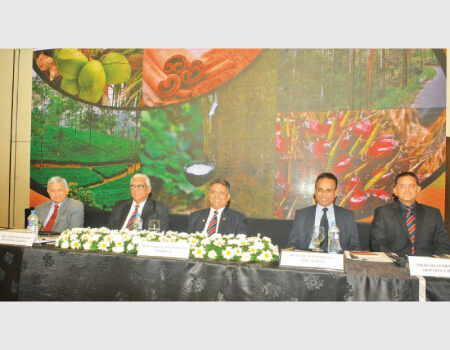
Please Share your Email if you Wish to Receive the Golden Tips & Tales Newsletter from History of Ceylon Tea Website

Even with a low crop the country has managed to earn USD 882 million from tea exports in the first 8 months of the year, Sri Lanka Tea Board Chairman Niraj de Mel told the 168th AGM of the Planters’ Association of Ceylon (PAC) in Colombo on Friday.
During the first 7 months, rubber, coconut and export agriculture has mustered USD 600 million, USD 590 million and Rs. 250 million respectively he said. However, De Mel said that the USD 882 million talked about was the country’s normal USD 100 -110 million per month income even in previous years. He said, “time has come for Sri Lanka to get back producing BOH tea and that too of better quality.”
De Mel however stressed that the Sri Lankan tea industry was under severe threat. “We always belittled the capabilities of our neighbour India. He said when he joined the industry 45 years ago in 1977 there was talk that the Indian tea industry was almost about to collapse but today they are the largest tea producer in the world accounting for almost 25% of the total market. Between China and India, they account for almost 70% of the global tea market and Sri Lanka has fallen to almost below 5%.
“We are very happy for getting very high prices in the recent past but this which we are enjoying can be for a short period because Kenya and India are very well organized now unlike 10 years ago. They are not only knocking on the doors but meeting the right people in the Middle Eastern countries especially the better economies of the Middle Eastern countries and they are coming up with the package of high types of tea.”
He said they were happy with the prices going high but the crop volume is low therefore the availability of different types of tea that suits those countries which have better options is diminishing.
“We are happy with the high prices but the receiver is not happy and now that Kenya and India are knocking at the door and if they can source the identical type of tea, two to three dollars cheaper than Sri Lanka, we are under threat.”
He, therefore, requested to go for a better leaf and make sure that Ceylon Tea regained what it was known for back in the 60s, 70s and even the 80s. “There was a lot of value addition in the industry but it was still about 40% and a lot more could be done if the industry stakeholders got out of their compartments and engaged with others in the value chain who had the know-how to bring about a bright future for Sri Lanka.”
Planters’ Association new Chairmen Senaka Alawattegama
In several instances, planters were forced to put their life and limb at risk due to mob violence incited by politically connected individuals and with fresh negotiations looming all possible steps should be taken to ensure that law and order prevailed on the estates moving forward for negotiations over wage reforms towards productivity lined based model which is the only practical way forward, Planters’ Association of Ceylon new Chairman Senaka Alawattegama told its 168 AGM.
He urged planters to continuously re-evaluate land use policy to make maximum use of all of the land allocated to them. The plantation sector was also facing a shortage of labour and for the RPC sector, the workforce had reduced from 327,000 in 1992 to approximately 115,000 today and showed no sign of stopping.
Alawattegama urged that every viable measure must be taken to reverse the migration of labour out of the plantation sector noting that the daily wage system that has been in place since the colonial era was simply not suited for the task.
He said Sri Lanka imports 229,000 MT of edible oil for domestic usage spending USD 150 million. He questioned those who oppose oil palm cultivation in Sri Lanka and whether it is better to spend dollars or conserve our foreign currency and produce oil palm in Sri Lanka.
Comments
(In keeping with the objectives of this website, all COMMENTS must be made in the spirit of contributing to the history of this estate, planter or person i.e. names, dates & anecdotes. Critical evaluations or adverse comments of any sort are not acceptable and will be deleted without notice – read full Comments Policy here)